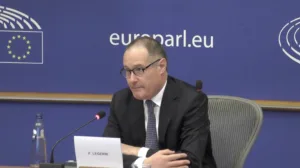Brussels – The same Frontex executive director who resigned over evidence of human rights violations “of a serious nature” by members of the European Border and Coast Guard Agency is now among the French far-right’s leading candidates in June’s European elections and accuses EU institutions of “encouraging a wave of migrants.” Fabrice Leggeri is on everyone’s lips in Brussels for the announcement that came over the weekend of his candidacy with Rassemblement National and for his broadsides to the European Commission on an issue that until 2022 saw him among the main culprits of harsh criticism of Frontex, undermining the credibility of the EU agency itself.

“The attacks and political pressures demonstrate the need to oppose current Europe,” reads the post published in X on Saturday (Feb. 17) to announce the choice of camp ahead of the June 6-9 vote: “The Migration and Asylum Pact encourages the influx of migrants and disregards the sovereignty of states; we must take concrete measures to end human trafficking and protect our borders.” Insinuations that—added to those of “encouraging a wave of migrants”—fit into the conspiracy strand of the great replacement theory, according to which migration to Europe is not the result of a spontaneous movement but of a project to replace the populations living on the continent. “We need to fight the wave of migrants, a challenge that the European Commission and Eurocrats downplay,” Leggeri further attacked, “My experience at Frontex confirms this: it is time to take concrete measures to protect our borders.”
 “Leggeri’s statement on migration policies is simply wrong,” the EU Commission spokeswoman responsible for Home Affairs and Migration, Anitta Hipper, sought to make clear, speaking with the Brussels press today (Feb. 19), stressing that “on the legislative level we have a political agreement after years of intense discussions” on the Migration and Asylum Pact. The same spokeswoman reiterated that “migration can and must be managed in an orderly way” and vindicated the work of the EU executive during the waning legislative term both on the front of “combating traffickers and organized crime with operational plans on all migration routes,” and on that of “strengthening the instruments, including financial ones, available to member states at the borders.” No comment, on the other hand, regarding the former Frontex executive director’s decision to take the field with the French far-right: “We do not comment on personal political choices and campaign news.”
“Leggeri’s statement on migration policies is simply wrong,” the EU Commission spokeswoman responsible for Home Affairs and Migration, Anitta Hipper, sought to make clear, speaking with the Brussels press today (Feb. 19), stressing that “on the legislative level we have a political agreement after years of intense discussions” on the Migration and Asylum Pact. The same spokeswoman reiterated that “migration can and must be managed in an orderly way” and vindicated the work of the EU executive during the waning legislative term both on the front of “combating traffickers and organized crime with operational plans on all migration routes,” and on that of “strengthening the instruments, including financial ones, available to member states at the borders.” No comment, on the other hand, regarding the former Frontex executive director’s decision to take the field with the French far-right: “We do not comment on personal political choices and campaign news.”
Yet the way in which the former number one of an EU agency went from an institutional post to a candidacy with a nationalist and particularly extremist party in his area of expertise raises quite a few questions about Frontex’s performance in recent years. “After I left my post at Frontex in April 2022, I realized that I had to engage politically to defend my convictions,” Leggeri wrote in his post, mystifying the reality that saw him dismissed in April 2022 after an investigation by the European Anti-Fraud Office (OLAF) into allegations of misconduct in relation to human rights violations at the EU’s external borders. As the EU Office report later revealed, Frontex under Leggeri stood out for active or passive involvement (i.e., not impeding violations) in pushbacks (illegal rejections of persons with a right to international protection at EU borders) implemented by the Greek Coast Guard. Moreover, Leggeri himself had been responsible for biased or misleading answers to the demands of the European Commission and Parliament, including criticism for “amateurism on operational issues, obsession on fundamental rights issues and bureaucratic cretinism.”
English version by the Translation Service of Withub



